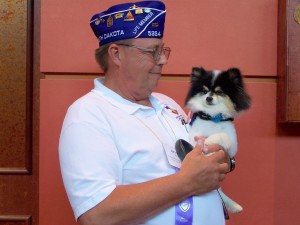Aug
2
SHELTER DOGS AND PTSD VETS
Filed Under Combat PTSD, Dogs, Life, Love, Pets, PTSD treatment, Service Dogs, Tears of a Warrior, War, Wisdom | Comments Off on SHELTER DOGS AND PTSD VETS
by Janet J. Seahorn

It is such a privilege to write our blogs and then hear back from some of our readers. The blog on “Tears of a Mother” brought many wonderful comments. One such reader sent this message which made me smile. He wrote:
A SHORT STORY. MY WIFE AND I HAVE BEEN MARRIED FOR 40 YEARS. WE ARE HIGH SCHOOL SWEETHEARTS AND WHEN I GOT HOME FROM MY LAST HOSP STAY FOR A PANIC ATTACK, I ASKED HER WHY SHE HAS STAYED WITH ME FOR SO LONG. HER EXACT WORDS WERE. “I KNEW YOU WERE A CHANGED PERSON WHEN YOU GOT HOME. HER FRIENDS AND FAMILY SAID I WAS DAMAGED. SHE TOLD THEM THAT THE MAN IS SCARED OF EVERYTHING AROUND HIM. AND THAT SHE LOVED ME”. I DO NOT TRAVEL TOO FAR WITHOUT MY WIFE. I CALL HER MY HANDLER.
Isn’t that just the sweetest compliment he gave his wife, “my handler”, which, as you can see, he stated with genuine love and gratitude. His message reminded me of a very endearing commercial for “shelter” dogs we have here in Colorado. It starts out, “Don’t pity a shelter dog — honor him. Shelter dogs aren’t broken, they’ve just experienced a little more of life. In many ancient times they would be considered wise. They are the ones with tales to tell and stories to write. They have faced life’s challenges with courage and pride, and survived with honor and dignity”.
Sounds like many of our amazing vets. Just like these shelter dogs who have experienced a bit more than their canine siblings, veterans aren’t broken, damaged, or to be pitied. Most have gathered a deeper wisdom regarding life. And, yes, they have tales to tell and stories to write. With courage and pride they continue to live every day of their lives with honor and dignity.
Shelter dogs and vets. Golly, what a wonderful way to view the challenges of life…and PTSD.
Apr
23
Dog—–God
Filed Under Combat PTSD, Dogs, Pets, Tears of a Warrior, Treating PTSD | Comments Off on Dog—–God
by Janet J. Seahorn

Look into the face of your loving four-legged pet, and I would bet you would see the eyes of GOD. A being so unconditionally loving and faithful, that nothing or no one could keep it from being near our sides. We have written several times about the value of pets. For someone living with Posttraumatic Stress or a serious Traumatic Brain Injury, pets can offer a sense of comfort and well-being that are beyond modern medications; and the side effects are far more positive.
We get many comments and videos from our readers testifying to the upbeat effects their pets have had on them. This week a friend sent us a one we had not seen before. We thought many of you would enjoy viewing this short and touching piece. We also included another written story that has appeared over the internet on many occasions. More than likely, most of you have read it, but every time I see it, and am tempted to delete without reading… something pulls me to the picture and I begin viewing it once more, ending always with tear filled Kleenexes.
You see, this last piece is a true chronicle of what many of our service people and their loving pets sacrifice for our country. Not everyone understands that pets pay a high price for their masters’ deployment. Yet, they do, silently, patiently waiting for that one special person to return. There is no greater joy than the homecoming of a beloved member of a family.
So here is to DOG and to GOD: D = Devotion; O = Omnipresent; G = Goodness/Gift; in any order it means the same thing.
Sep
1
Never Apart
Filed Under Dogs, Pets, PTSD treatment, Purple Heart | 1 Comment
by Janet & Tony Seahorn
 It was a small, black & white, furry 5-pound bundle of emotional and physical relief. His name was Petie, the keeper of an adult warrior, Purple Heart, Vietnam Veteran.
It was a small, black & white, furry 5-pound bundle of emotional and physical relief. His name was Petie, the keeper of an adult warrior, Purple Heart, Vietnam Veteran.
The vet trained him as his first alert. An important task. Petie knew when his master needed to take his medications. He would wakeup Dennis at various times in the middle of the night so that specific pills were administered at the most critical time in order to keep the Post Traumatic Stress under control.
Dennis trained Petie especially for this purpose. They are best friends and constant companions, never apart. This small, furry medic is essential, not just for the vet’s physical well-being, but even more important, his emotional/mental stability.
Petie alerts Dennis when there is danger in the surroundings. He watches intently everything that goes on with his owner and around his owner. If Petie isn’t comfortable his master knows to pay closer attention to his current environment. If Petie doesn’t like you, more than likely Dennis isn’t going to become too friendly either.
They coexist, two different species, one functioning entity.
There are numerous organizations that train service dogs. Dogs that serve the deaf, blind, and epileptic individual. Dogs that act as the arms and legs of those who no longer have capacity to move on their own. Now, some of these groups are training dogs to do something even more challenging, knowing when their owner may go into a PTSD anxiety attack.
The dog must sense when such attacks may occur before they actually manifest themselves. They know even before the person that something is coming on – giving their owner an opportunity to breathe, use relaxation techniques, and take medication if necessary. They provide a sense of security and well-being in a world filled with unpredictability and potential stressors.
One such training organization is NEADS – Dogs for Deaf and Disabled Americans.
They are conducting an in-depth study of nine-ten Iraq vets who has severe PTSD. The study’s focus is to evaluate the most effective canine training methods that serve the sensitive needs of a veteran suffering from combat stress.
This is a very expensive and challenging research project because it must take into account the behaviors of two very different organisms: human and canine.
It will be a critical piece of information given the increasing number of individuals returning from the Iraq and Afghanistan theaters and those that have served in past wars such as Vietnam and the Gulf War.

